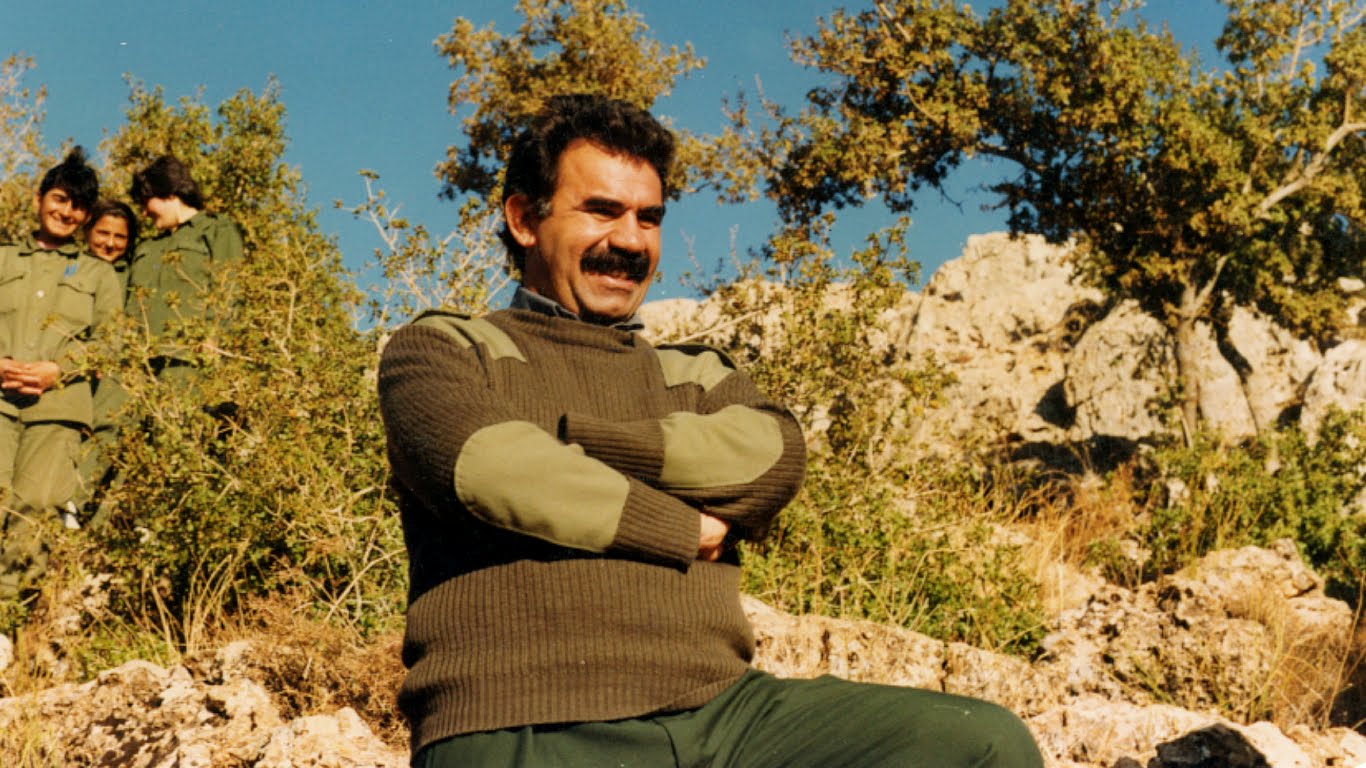“Killing the Man”
‘KÛŞTINA ZILAM’ – KILLING AND TRANSFORMING THE DOMINANT MAN
One important step in the development of Abdullah Öcalans perspectives is the theory of „killing the dominant men“. The theory is the result of a long process of struggle and theoretical development. Through both experience and analysis, Abdullah Öcalan arrived at the conclusion that the original oppression in history is not that of class, but rather that of gender. After long discussions with the women comrades of the movement and reflections about his own relationships to women, in 1986 Öcalan wrote „The Question of Women and Family in Kurdistan“. He described the family as a microcosm of the state. The Kurdistan Women’s Movement has taken a wide range of steps to struggle against patriarchy, both practically and theoretically. Practical steps include the creation of the autonomous Women’s Army and the Women’s Movements. Theoretical steps along with Kuştina Zilam include the Theory of Separation and the Women’s Liberation Ideology. In 1996, the Theory of Separation was introduced. It was necessary to physically and mentally separate from the web of patriarchal relations in order for women to reach a personality struggling for freedom. The goal was to cut from the toxic influences of the system, and to create space to develop themselves. Following this, Abudllah Öcalan also developed a deep analyzes of the situation of manhood and a radical solution: Abdullah Öcalan discussed the topic of „Killing the Man“ while taking part in one episode of the Kurdish TV Channel MED TV on 26 February 1998, when he was asked what he had meant by “taking women from men’s grasp” and “Killing the Man”, and on which basis women and men could unite. “I ask the following, or I want to develop a solution for the following: To kill both men and women who have been used for centuries as the foundation of this system! Of course, I don’t mean this in physical terms. To announce the moral, emotional, and relationship codes as illegitimate even if they are based on laws! (…) I’m talking about a general movement for divorce in mentality. Even those who are married or engaged must first divorce themselves from classical understandings. If necessary, their official marriage can continue. But it is very appealing to me to make a change in the essence and to realize a general divorce movement in this sense. In order to gain more or less their share of the revolution, everyone must do this. This is the first.“
On other occasions, while giving educations, Abdullah Öcalan repeatedly pointed out the principles that should be internalized and applied by all male comrades in their approach towards women: “To kill a man means to kill a man who is not beyond the ugly attitude of a tyrant, a despot, a consumer towards a woman. Every man, must know this. What should I do with men who have those attitudes against women? This masculinity is a masculinity that is not able to do anything useful. He cannot fight properly, he cannot even implement a proper tactic. Everyone should know that the age of exploiting a woman sexually is now over. It should now be known that the woman is a vital and energetic human being. Therefore, it is important [for you as men] not only to be a bit more forthright, but also to move yourself closer to equality and freedom. Otherwise, it is not possible to meet and talk with women.”
The topic of „killing the dominant men“, and what is meant by it, can also be approached by looking at the examples martyrs of the Kurdish freedom movement have given and in which way they fought against the dominant men in their own personality. Some of these are, freedom fighters like Commander Agît (Mahsum Korkmaz), Fikri Baygeldi, Şehid Erdal (Engin Sincar), Rustem Cudî, Qadir Usta, Atakan Mahir, Diyar Xerib Muhammed, Qasim Engin and many more are remembered as examples of male comrades who have struggled to build a socialist free man’s personality. Their approaches towards life, struggle and comradeship challenged patriarchal patterns, views and habits. This went beyond their immediate surroundings and affected the whole of society. Şehîd Hêlîn Murad remarked: “If the bond to the line of women’s freedom is declared as the basic ideological benchmark for men, a positive foundation is created. For this, the friend Fikri Baygeldi is a historical personality who should always be remembered in our comrades’ education, since he exemplarily defended the Women’s Liberation Ideology and was connected to the women’s vanguard.” Fikri Baygeldi was born in 1974 in Lice district near Amed in North Kurdistan, where he lived with his family until 1988. He saw that feudalism was predominant in his family and the surroundings in which he grew up. In turn, he realised that it had also a serious impact on his own personality. Due to a blood feud, his family had to move to Amed when he was 14. In 1990 Fikri Baygeldi joined the first mass uprisings of the Kurdish people in North Kurdistan. He was deeply affected by the ideas and actions of the PKK, which he described as becoming “spiritual”. When his father discovered that he had relations with party members, his father used force to prevent his brothers and sisters also engaging with the struggle. Against their will, the whole family was moved to the Sakarya province in the west of Turkey. Nevertheless, Fikri succeeded in continuing his relations with comrades from the movement, and in March 1992 he joined the guerilla liberation forces. Only 9 months later, he fell into captivity in the hands of the Turkish army. For more than four years of his imprisonment, he stayed in the Çanakkale prison. Here, he was deeply touched by the stand taken by his female comrade Sema Yüce. On the 8th of March 1998 Sema Yüce set her body on fire as an act of resistance against state oppression and patriarchal dominance. Only some days later, Fikri Baygeldi chose the same form of action behind the same prison walls, leaving a letter with a strong and radical message behind. Concluding his letter with the statement “long live my commander comrade Sema”, he wrote: “The PKK relates to humanity. It is a movement that aims at the liberation of humanity and nature and proves this in its practice. In my personality, I carry a lot of mentalities that contradict the understandings of the party. These mentalities are generally not different from the old Kurdish reality. […] Now, rather than reiterate the known problems, we need to put it into practice. We can achieve true freedom in life and victory in struggle only with this method. Our martyrs do not want us to be demagogues. They want us to be virtuous personalities who have attained personality by their words. Comrade Sema draws attention especially to these problems in her last letter. Comrade Sema is my commander, and I am only a soldier of a Kurdish woman who became a commander through her action. A warrior has to act according to the commander’s instructions. And I am aware of this necessity. The action I will do, will bring to life what I am conscious of. I believe that the way to be worthy of you and our hero martyrs passes here. With my action I will make the action of comrade Sema even more magnificent and I will explode like a grenade in the mind of the enemy.” Şehid Qadir Usta (Gayyaz Koyuturk), an Arab comrade from Antakya joined the PKK in 1995. Until he lost his life in an ambush by the Turkish army, he fought as a guerilla in the mountains of Kurdistan for over 20 years, to end occupation and ensure free relations between peoples and genders. In a letter he wrote to his niece, he tells her about his experiences. He tells her that he wants to remove every last cell of his body from the deepest remains of God the Father, and that he is now able to understand the oppression of women.
After the step of developing the theory of „killing the dominant men“ was made and Abdullah Öcalan had also practiced this struggle in his own personality, he went on to develop further ideological steps. One of them is the theory of a free and equal life „hevjiyana azad“, which is a basic principle of the Democratic Nation project. It is based on both the theory of separation and of killing the dominant men, showing a way how a society can live together, while struggling for freedom.

